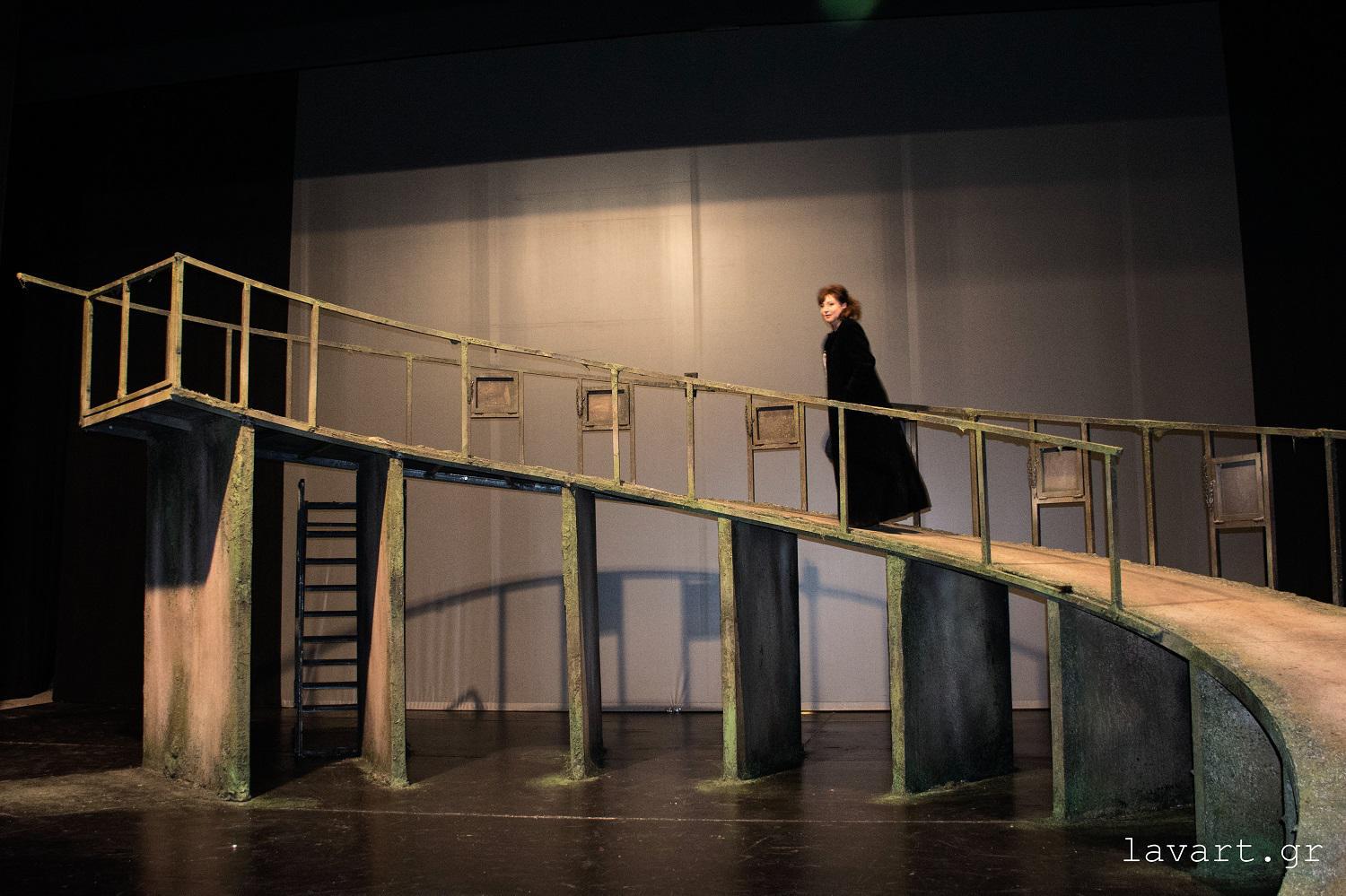Dimitris Farganis (Lavart) – There is a certain type of curse associated with Macbeth. Do you believe you took on any risks by putting it on?
Anastasia Revi – There is always a risk when one directs a Shakespeare play. He is, after all, in my opinion, the greatest playwright of all times; the ultimate connoisseur of the human soul. A true artisan. He uses an amazing language, but at the same time, he employs a delicate intricacy when composing, which results in a mesmerizing depth in plot and characters. Macbeth in particular was the product of careful handling of the above tools plus the use of the supernatural which has evoked such rumors of curse and superstition over the years. In Britain, actually, we avoid referring to this play by its title, we rather call it “The Scottish Play”.
Dimitris Farganis (Lavart) – An interesting tradition.
Anastasia Revi – Macbeth is a combination of politics and supernatural. A bizarre combination that bears a bit of risk anyway. My approach is not experimental neither contemporary, but it is of a rather classic nature that only diverges from the long-established path with a few twists, here and there, however, it preserves its character and aesthetic quality.
Dimitris Farganis (Lavart) – Do you tend to do that when directing your plays?
Anastasia Revi – I am a devotee of classic pieces and grand authors, as this is evident to anyone who is familiar with my work. In the last few years I have directed productions like Medea, the Oresteia trilogy, Antigone, Lysistrata, Salome by Oscar Wilde, works by Edgar Alan Poe and Tennessee Williams, all classic pieces. I’ve always been captivated by their unique depiction of the human soul; and in my opinion, even though they are timeless, they still allow the directors to use their imagination and include some distinctive touches of their own. That’s what I did with Macbeth. I approached Macbeth, this timeless masterpiece, through my eyes, my soul, my imagination, my brain.
Dimitris Farganis (Lavart) – I found certain additions to be very interesting. Things that haven’t been introduced in any other plays, such as the spiral set for example.
Anastasia Revi – Indeed. The spiral set, in particular, was inspired by the Scottish Highlands and their abundance of lakes and mountains. It signifies the ascension driven by one’s ambition and the inevitable fall when the ambition becomes excessive.
Dimitris Farganis (Lavart) – What motivated you to accept the proposal of NTNG (National Theatre of Northern Greece) to direct this play?
Anastasia Revi – Frankly, I’m only ever motivated to come to Greece if the proposal is exciting and of certain standards. The opportunity to stage this unique Shakespearean piece here at the NTNG , was a beautiful gift . Shakespeare, the idea of returning to this city that I was living as a University student twenty years ago and this particular play! Oh, I didn’t think twice!
Dimitris Farganis (Lavart) – That’s beautiful. So Macbeth, translated by Dimitris’s Dimitriadis, an author and translator who has demonstrated some amazing work. Was it hard to work with his translation?
Anastasia Revi – I will repeat myself by saying what I already said.
Dimitris Farganis (Lavart) – That Dimitriadis’s work speaks for itself?
Anastasia Revi – Exactly. I have also read the Kartheos’ and Chimonas’ translations. Dimitriadis’ was the best. I was listening to the English text being performed by my actors in Theatre Lab Company, while at the same time I was reading it in Greek. It was a lot of hard work. Dimitriadis’ translation is exquisite in the way it follows Shakespeare’s verse. It ends exactly where the English one does. English and Greek text breathe the same, that’s why in my opinion the translation is brilliant.
Dimitriadis turns it into artwork. He uses exquisite language to preserve the appropriate Shakespearean tone and depth.  Dimitris Farganis (Lavart) – Let’s talk about the addition of the love scene in the play.
Dimitris Farganis (Lavart) – Let’s talk about the addition of the love scene in the play.
Anastasia Revi – This scene has really impressed the audience. In my approach, Macbeth and Lady Macbeth, are two passionate people who are very much in love. They haven’t seen each other for so long. He is the savior of an entire nation which has been swallowed up in a two-front war, he is the ultimate hero. She admires and craves him. I imagined Macbeth walking in the rain, through the mist to return to his home in Forres. After returning home bearing the prophecy that he’ll become king, it is only natural to expect this act of love that I have added. What makes more sense than two people in love actually making love? Even their sinful plan hides emotions. They are trying to fill the void of their lost child. We are used to seeing Lady Macbeth as a woman drenched in spite and hatred. But what if she designs and commits evil acts out of pure adoration to her husband? Neither the love scene nor the rain exist in Shakespeare’s script but I believe that this addition gives an intriguing twist in the way we perceive the characters’ inner world.
Dimitris Farganis (Lavart) – Indeed, a woman deeply in love would agree to become an accomplice to almost anything.
Anastasia Revi – A man would have as well, but a woman even more so. I also think that the red dress and its multifunctional use in this love scene lifts not only the scene but the whole aesthetic choice.
Dimitris Farganis (Lavart) – This Shakespearean play is staged in a country, which, judging by its funding policy, does not consider culture a priority. Did this ever cause you any uncertainty over your whole endeavor?
Anastasia Revi – On the contrary. I feel that in times of crisis people need art so much more. I have staged plays in Dublin, New York, Edinburgh, Belgrade, Prague. I have travelled a lot and participated in a good number of International Theatre Festivals. I always feel the agony of connection with the audience. Being in Greece it’s even harder as I was born here.
Dimitris Farganis (Lavart) – There are intense symbolisms to be found in this play. We have observed for instance, the spiral staircase, which stands out and on which many magnificent acts are carried out.
Anastasia Revi – Symbolism is a big part of this play and of my personal work. Macbeth is the most blood stained Shakespearean tragedy. Shall we talk about the symbolic elements of the production? The rose petals for example. As soon as the first murder, the murder of King Duncan is committed the stage is filled with rose petals. Lady Macbeth even pulls a few out of her drinking glass during dinner. They obviously signify the blood that has been spilled but not in a naturalistic way. The witches are not what somebody expects as Macbethean witches but on the contrary they are slaughtered children who play with prophecies. Those dead children actually stand for the countless children deaths which Macbeth is responsible for, both as a warrior and as a king. He never faces the witches when he talks or listens to them. He always looks out. We are never sure if those witches exist or whether they are simply apparitions, figments of his imagination.
Another symbolic element is the crown that resembles the skeletal remains of a dinosaur of some kind. This strange crown is worn by three different characters throughout the play. It is passed from Duncan, to Macbeth and then to Malcolm. Could this raise questions about Malcolm’s character? Is he really any better than Macbeth?
And finally the most obvious piece of symbolism is visible on the video wall that is full of symbolism. An example would be the way colors and liquids interchange Macbeth’s doubts and dark thoughts and his certainty and love for Lady Macbeth respectively.
Dimitris Farganis (Lavart) – How important is this kind of symbolism to you?
Anastasia Revi – It is my way of communicating with the audience. It is my process and approach. I want audiences to experience my shows through their subconscious, senses , soul and last their mind. and That’s what I’m interested in doing. I am not interested in directing realistic plays and, to be quite frank, I don’t even know how to direct them as I don’t like small stories. I don’t mean to sound arrogant or anything but I’m not interested in stories next door.
I am fascinated by powerful and epic stories, complicated characters, heroes, legends and the big unanswered questions of the classics. Dimitris Farganis (Lavart) – So will it be the good or the evil that we do that is going to be returned to us?
Dimitris Farganis (Lavart) – So will it be the good or the evil that we do that is going to be returned to us?
Anastasia Revi – Whatever goes round, comes around. What one emanates is what one is bound to receive in return. Cast light, and your life shall be showered with light. Channel love, feel love, show love and love you will receive.
Dimitris Farganis (Lavart) – You are an optimist…
Anastasia Revi – Yes, but I guess no one can assume that from the plays I choose to direct, ha? (Laughter) Loving dark themes is my way of exploring my complicated existence, ha ha! Scotland, Britain, the rain, the mist help me banish my fears. On one side I adore the cursed poets, gothic literature, the haunted souls and on the other hand I believe in the triumph of good over evil. It may be a paradox but it works for me.
Dimitris Farganis (Lavart) – You have been in London for about twenty years now. In what ways do British actors differ from their Greek counterparts?
Anastasia Revi – British actors have a fantastic technique and great discipline. Greek actors have temperament and are emotionally vibrant. It is my job as a director to bring out all of those qualities in the actors I work with in both countries and guide them in achieving perfection. Living there for the past twenty years has certainly helped me succeed in these efforts.
Dimitris Farganis (Lavart) – How does each side approach the theatre, what defines their aestheticism as far as the theatre is concerned?
Anastasia Revi – Let’s talk about London which is a metropolis, carrying this unique cosmopolitan quality. London scene is vast. West End consists of these colossal productions such as The Phantom of the Opera, Les Miserables, The Lion King, just to mention a few; the Off West End consists of plays of a more experimental nature, but of no lesser aesthetic quality and then is the Fringe or underground scene that one can truly see everything in it, from the most realistic plays to the most eccentric ones. And the underground scene is practically infinite like the West End and the Off West End. You can see playwrights and productions from all over the world. I have seen thousands of shows from phenomenal directors like Robert Lepage, Simon Mc Burney, Thomas Ostermayer, Robert Wilson and many others and also phenomenal actors like Ian Mc Kellen, Judy Dench, Mark Rylance, Ralph Fiennes, Nicole Kidman, Maggy Smith, Jude Law, Benedict Cumberbatch.
Dimitris Farganis (Lavart) – Let’s talk about the actors there.
Anastasia Revi – The British educational system is known for its discipline and technique. But, of course, there are many different types of actors as there are different types of people. Some are more physical, others who play with their heart and soul, others who are talking heads, others who play a variety of musical instruments, others who can act and sing and dance and of course those who combine all of the above. I am really fond of them. You have to understand that the market is huge. When advertising for an audition in Theatre Lab Company we have to narrow it down to an extreme degree simply because of the sheer volume of applicants. Everything a director might be looking for can be easily found. We ourselves always try to make the process as easy, transparent and sincere as possible, by describing every detail of what we are after, so that we don’t make anyone’s life any harder.
Dimitris Farganis (Lavart) – Apart from the experienced actors in your productions there are also recent graduates from the NTNG Drama School. You too are a graduate with distinction, of the NTNG school. What is your advice to them?
Anastasia Revi – Not to lose their fresh energy, not to become mundane and small, not allowing the world eat their soul, not to deal with small talk and small thinking, On the contrary to be broad-minded. To travel a lot, read, watch movies, go to the theatre, to exhibitions, to meet important mentors and have the capacity to acknowledge and recognize them as such, to experiment, to create art regardless of money. Famous artists like Picasso, Sara Bernard and contemporary theatre practitioners have not been rich while young and experimental. Of course, we all want to be get paid for what we do but one does not set out to become an artist in search of wealth. Finally to keep your eyes wide-open and hold on to eternal young energy.
Dimitris Farganis (Lavart) – What would it take for you to consider coming back to Greece?
Anastasia Revi – I don’t want to come back to Greece. Even though I love the endless beauty of Greece, but it is a small country and after a while that makes me feel like I repeat myself. I like the big picture. London is huge, always expanding, always running faster than me, faster than all of us who live there and that’s refreshing. Something new and exciting happens every day in different parts of the city.
Dimitris Farganis (Lavart) – Do ethics exist in our day and age?
Anastasia Revi – Yes, of course they do. On many levels and in many ways. Respecting someone’s time and personal space, being kind, putting yourself in somebody else’s shoes, being concerned about the common good, giving your best every day, being honest towards yourself and others, not being indifferent towards the refugees and the homeless. These are just examples of daily ethical acts.
Dimitris Farganis (Lavart) – What do you consider indecent?
Anastasia Revi – Indecent for me is whatever is fake and shallow. Back talking is indecent, gossiping is indecent and vulgar. When words are not consistent with actions and intentions. When lies replace honesty. And I’d go as far as to say that I am really fond of lies, as lie is the talent of illusion, the beautiful convention of theatre for a professional story teller like myself.












